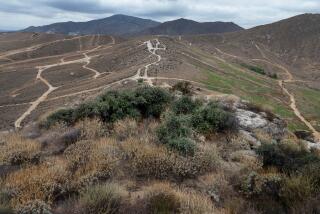Protection of ‘Hole in Headwaters’ Urged
When a $480-million deal was struck last year to spare the majestic old-growth redwoods of the Headwaters Forest near Eureka, an end to one of California’s most contentious timber wars seemed at hand.
But the fight isn’t over.
Logging foes are now pushing to save what they’ve dubbed the “Hole in the Headwaters,” a thousand-acre stand of unprotected trees surrounded by the newly created wilderness sanctuary.
Today they go to court in Eureka to ask a judge to block plans by Pacific Lumber Co. to log the area. Should the ruling--expected later this week--go against them, forest activists have vowed to launch a new round of mass demonstrations, tree-sitter protests and other acts of civil disobedience.
Already, activists have cranked up the rhetorical volume, suggesting that skulduggery is afoot in Sacramento. They contend that Gov. Gray Davis pushed forestry officials to rubber-stamp Pacific Lumber’s plans instead of letting the public weigh in, an allegation the governor’s office rejects.
The renewed tussle has left officials at Pacific Lumber and the state Department of Forestry bewildered. Most had hoped that wrangling over Headwaters would end after a deal in March 1999 ushered in public purchase of about 10,000 acres of old-growth forest, putting the ancient trees forever off limits to logging.
But as part of that agreement, Pacific Lumber got a swath of second-growth redwoods--most of them 60 to 80 years old--at the far northern edge of the Headwaters preserve.
Logging foes have attacked this arrangement as an unacceptable compromise that would denude hillsides and send silt cascading down into the Elk River, a fragile spawning ground for endangered salmon.
The Sierra Club and the Environmental Protection Information Center filed suit after Pacific Lumber got Forestry Department permission earlier this year to use helicopters to haul timber off 595 acres of the property.
The activists contend that noise from the huge, twin-rotor choppers will spoil the wilderness experience for visitors to the protected forest, which is separated by a ridgeline from the area slated for logging.
“They’re loud--it’s hard to overemphasize how loud they are,” said Paul Mason, executive director of the environmental center. “It’s this phenomenally deep, rumbling roar.”
Pacific Lumber officials counter that helicopter logging is far easier on the environment than tractors and other heavy equipment that can scar hillsides--and still make noise.
“We’re using the most environmentally sensitive method of logging, and it’s still not good enough,” said Mary Bullwinkel, a company spokeswoman. “For some people, whatever we do won’t be good enough.”
As concessions to state regulators, Pacific Lumber also decreased the acreage it proposed to log by 15%, agreed to restore damaged swaths of forest and promised to avoid logging when roads are wet and susceptible to erosion.
Environmentalists say such steps are fine but fall short. They note that Pacific Lumber agreed as part of last year’s deal to abide by the nation’s strictest logging rules on its 200,000 acres in California. Logging foes believe the company should live by those tougher restrictions--such as a ban on timber cutting near seasonal streams--in the Headwaters property as well.
Pacific Lumber officials counter that the rules don’t apply because the property inside Headwaters was approved for harvest before last year’s deal was struck.
State forestry officials agreed. Although the agency’s advisory board recommended that public hearings be held, department officials approved Pacific Lumber’s altered plans after a cursory review earlier this year.
Environmentalists suspect that politics played a role in the fast-track decision, suggesting that the governor--an unabashed friend of big business--pushed forestry officials to avoid any public hearing on Pacific Lumber’s altered logging plans.
“The department just rubber-stamped the changes,” Mason said, “apparently at the direction of the governor.”
Louis Blumberg, a Forestry Department spokesman, said Davis had no involvement in the agency’s decision-making process. Instead, he said, the department viewed Pacific Lumber’s switch to helicopter logging and other changes as an improvement that helped the environment and didn’t warrant public debate.
Mason sees a ready remedy: Buy the Hole and make it part of Headwaters.
“The public spent a boatload of money on the reserve,” Mason said. “If we spend a little more, we could protect this investment forever.”
(BEGIN TEXT OF INFOBOX / INFOGRAPHIC)
Logging Debate
Environmentalists and Pacific Lumber Co. are at odds over plans for an area known as the “Hole in the Headwaters,” where logging is allowed under a landmark 1999 agreement that created the Headwaters Forest Reserve.
More to Read
Sign up for Essential California
The most important California stories and recommendations in your inbox every morning.
You may occasionally receive promotional content from the Los Angeles Times.










